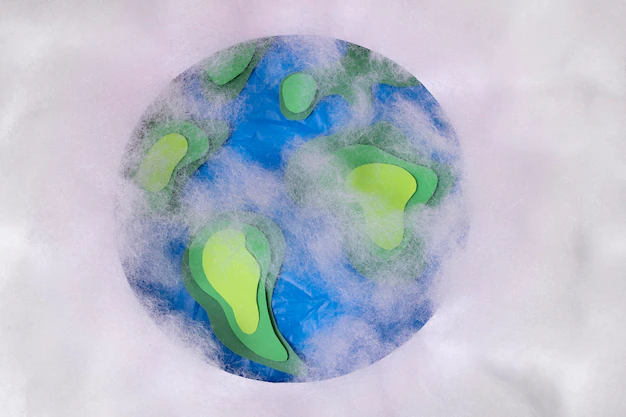Essay on Global Warming

Global warming is indeed a huge problem facing our planet today. But what many people don’t realize is that there are things we can all do to help slow down and even reverse the effects of climate change. Read on to find out what you can do to make a difference.
What Is Global Warming?
Global warming is the long-term rise in the average temperature of the Earth’s climate system. It is a component of current climate change and has been demonstrated by direct temperature measurements and by measurements of various effects of the warming. The term commonly refers to the mainly human-caused observed warming since pre-industrial times and its projected continuation, though there were also much earlier periods of global warming. In the modern context, global warming and climate change are used interchangeably, but climate change includes both natural and human causes of recent climate change.
Over the past century, Earth’s average surface temperature has risen by about 1.1 degrees Fahrenheit (0.6 degrees Celsius). The main component of global warming is increased emissions of greenhouse gases. Greenhouse gases like water vapor, carbon dioxide, methane, and nitrous oxide trap heat in Earth’s atmosphere causing Earth’s average temperature to rise.
The primary cause of global warming is human activity, like burning fossil fuels, like natural gas, oil, and coal. Burning these materials releases what are called greenhouse gases into the Earth’s atmosphere. There, these gases trap heat from the sun’s rays inside the atmosphere, causing the Earth’s average temperature to rise.
Over time, the build-up of greenhouse gases in Earth’s atmosphere has caused Earth’s average temperature to rise about 1.1 degrees Fahrenheit (0.6 degrees Celsius) since pre-industrial times. The effects of global warming are already being felt around the world in the form of more extreme weather events, like more frequent and more intense hurricanes, floods, downpours, and winter storms.
The Greenhouse Effect
The greenhouse effect is one of the most talked-about topics when it comes to global warming. But what is the greenhouse effect? The greenhouse effect is when gases in the Earth’s atmosphere trap heat from the sun. These gases include water vapor, carbon dioxide, and methane. The trapped heat makes the Earth’s atmosphere warm, which can lead to an overall increase in the Earth’s temperature – aka global warming.
There are a few things that contribute to the greenhouse effect. First, the sun emits radiation in the form of light and heat. This radiation hits the Earth’s atmosphere, and some of it is reflected into space while some of it is absorbed by greenhouse gases. Greenhouse gases absorb the heat and then re-emit it in all directions, including back toward the Earth’s surface. This process makes the Earth’s atmosphere warm and contributes to global warming.
Second, human activity can contribute to the greenhouse effect. Burning fossil fuels like coal and oil releases greenhouse gases like carbon dioxide and methane into the atmosphere. These gases add to the natural greenhouse effect and worsen global warming.
Causes of Global Warming
There are many causes of global warming, but the most significant is the release of greenhouse gases into the atmosphere. These gases trap heat and cause the Earth’s temperature to rise. Other causes of global warming include deforestation, burning fossil fuels, and agricultural practices.
Deforestation is a major cause of global warming. Trees act as a natural sink for carbon dioxide, absorbing the gas and releasing oxygen into the atmosphere. This process is disrupted when trees are cut down, and more carbon dioxide is released into the air. Burning fossil fuels such as coal and oil also emit greenhouse gases into the atmosphere. And finally, agricultural practices such as livestock farming and clearing land for crops contribute to global warming by releasing methane gas into the air.
Reducing our reliance on fossil fuels, protecting our forests, and changing our agricultural practices are essential steps in combating global warming.
Impacts of Global Warming
Global warming is already having a significant impact on our planet. The Earth’s average temperature has risen by about 1.5 degrees Fahrenheit since 1880, and it is projected to rise another 0.5 to 8 degrees Fahrenheit by the end of the century. This may not sound like much, but it is enough to cause major changes in our climate.
As the Earth’s temperature rises, we are seeing more extreme weather events such as heat waves, droughts, and floods. The oceans are also being affected by global warming. As the water heats up, it expands and causes sea levels to rise, putting coastal areas at risk of flooding and erosion.
Global warming also has a major impact on plant and animal species. As the climate changes, many species are struggling to adapt. Some plants and animals are moving to new areas where the climate is more suitable, but others cannot adapt quickly enough and are at risk of extinction.
Effects of Global Warming
As we have seen, global warming has several severe effects on our planet. These effects are likely to become even more pronounced in the future as average global temperatures continue to rise.
Some of the most serious effects of global warming include:
1. Widespread droughts and food shortages
As global temperatures rise, many regions of the world are becoming drier, leading to widespread droughts that are in turn causing food shortages. In some parts of the world, such as Africa, these shortages are already causing severe hardship.
2. Extreme weather events
Global warming also leads to more extreme weather events, such as hurricanes, floods, and heatwaves. These events can cause loss of life and damage to property.
3. Melting ice caps and rising sea levels
As the ice caps melt, sea levels are rising, causing problems for coastal areas and making it more difficult for animals that rely on ice for their habitat.
4. Spread of disease
As global temperatures rise, so does the risk of spreading disease. Mosquitoes, which carry diseases like malaria, can survive and thrive in warmer climates.
5. Loss of biodiversity
Global warming is also causing a loss of biodiversity, as some animals and plants cannot adapt to the changing climate. This loss of biodiversity can have severe consequences for the planet’s ecosystems.
Solutions to Global Warming
There are many things that individuals can do to help reduce the amount of greenhouse gases released into the atmosphere. One way is to drive less, and this can be done by carpooling, biking, or walking more often. Another way to reduce greenhouse gas emissions is to recycle and compost.
You can also help fight global warming by using energy-efficient appliances and light bulbs and conserving energy. Finally, you can support renewable energy sources like solar and wind power. These things will help reduce the amount of greenhouse gases in the atmosphere and slow down the effects of global warming.
As individuals, we can help reduce the effects of global warming by making small changes in our everyday lives. However, it is also important to remember that the only way to solve the problem of global warming truly is through large-scale action. Governments and businesses need to work together to develop policies and technologies that will dramatically reduce greenhouse gas emissions. Only then will we be able to slow down and eventually stop the effects of global warming.
Conclusion
In conclusion, global warming is a very real and serious issue. We must do something now to reduce the amount of greenhouse gases that are being released into the atmosphere. This can be done by planting trees, using less energy, recycling, and driving less. We must act now before it’s too late.
Hey kids, how much did you like Essay on Global Warming? Please share your view in the comment box. Also, please share this story with your friends on social media so they can also enjoy it, and for more such stories, please bookmark storiespub.com.
Suggested Article –
- An Essay on Diwali | Deepawali the Festival of Lights
- 1000 word essay on Mahatma Gandhi in English
- Essay on Environment for the Students in English
- Air Pollution Essay for the Students
- Essay on Child Labor for Students and Children
- Essay on My School for Students
- Essay on Newspaper
- Tree Essay for Students and Children
- Essay on Elephant for Students and Children in English?
























